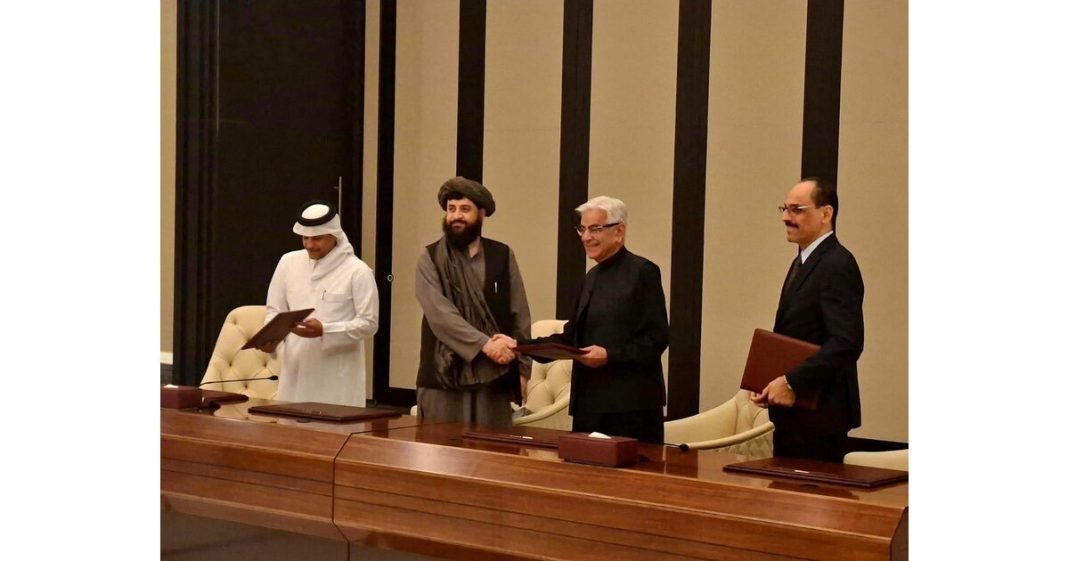Nearly a week-long negotiation held in Turkey between Pakistan and Afghanistan ended on Friday morning, with both sides agreeing to continue the ceasefire. The next round of meetings shall begin on November 6th to further the discussion on the framework.
The first round of negotiations concluded following several roadblocks and stalemates amid relentless efforts from mediators- Qatar and Turkey.
From Fire to Dialogue: How Border Clashes Forced the Talks
Pakistan and Afghanistan were brought to the negotiation table following the border skirmishes and rapid deterioration of ties between the two countries. The second round of negotiations concluded on Friday after Pakistan had officially announced that the talks had “failed” and that its negotiators were preparing to return home.
In the final round of the negotiations, all parties reaffirmed that the purpose of the talk was to reinforce the ceasefire originally agreed upon in Doha, whereas both sides maintained that to would continue the ceasefire on the condition that Afghan territory would not be used for cross-border terrorist attacks against Pakistan.
The understanding also calls on the Afghan Taliban to take decisive, clear, and verifiable action against groups such as Fitna al-Khawraj TTP and Fitna al-Hindustan BLA. It is also agreed upon that the next round of talks will be held in Istanbul on November 6 to finalize details and an implementation mechanism.
Joint Statement on the Talks Between Afghanistan and Pakistan Through the Mediation of Türkiye and Qatar https://t.co/y1SH30i88Q pic.twitter.com/wH4GW3SC9k
— Turkish MFA (@MFATurkiye) October 30, 2025
The negotiating team has also agreed to build a joint monitoring and verification mechanism to ensure compliance and to impose penalties on any parties violating the agreement. Turkey and Qatar, as mediators of the negotiations, praised both sides for their willingness and participation and reaffirmed their commitment to supporting lasting peace and stability in the region.
“All parties have agreed to put in place a monitoring and verification mechanism that will ensure maintenance of peace and impose a penalty on the violating party,” said the joint statement released by Türkiye’s Ministry of Foreign Affairs.
Taliban spokesman Zabihullah Mujahid, commenting on the development, said, “Just as the Islamic emirate seeks good relations with other neighbouring countries, it also desires positive ties with Pakistan and remains committed to relations based on mutual respect, non-interference in internal affairs, and not posing a threat to any side.”
During the negotiations, Pakistan stood firm on its principal demand that Afghanistan should take clear, verifiable, and decisive actions against the TTP hideouts and other terrorist groups involved in orchestrating attacks on Pakistan from Afghan soil.
Pakistan’s Red Line: “No Tolerance for Cross-Border Terror”
Army Chief Field Marshal Asif Munir, speaking on Friday, reiterated Pakistan’s red line. He said that while Islamabad wants peace with all its neighbors, it will not tolerate the cross-border terrorism that is being perpetrated from Afghan soil.
It is noteworthy to remember, PAF conducted airstrikes across several locations in Afghanistan following deadly attacks on Pakistan Armed Forces in Khyber Pakhtunkhwa, with the Spin Boldak-Chaman border crossing being the hotspot of the activities. During these strikes, Pakistan targeted the Hafiz Gul Bahadur Camps in Afghanistan.
Read more: Russia Denies Putin Threatening Pakistan amid Pak-Afghan Tensions
Words and Wounds: Airstrikes That Deepened the Divide
The conflict worsened when attacks were launched from Pakistan on Pakistan border posts at multiple locations on the Pakistan-Afghanistan border. Kabul claimed these attacks were retaliation for the Afghan airspace violation by Pakistan. The attack soon spiraled into a relentless exchange of fire, as Pakistan rejected ceasefire calls by the Afghan government following the initial attack.
جمہوریہ ترکیہ میں اسلامی جمہوریہ پاکستان کے ساتھ مذاکرات کے حوالے سے امارتِ اسلامی افغانستان کے ترجمان کا بیان https://t.co/JR8WchoNie
— امارتِ اسلامی اردو (@IEAUrduOfficial) October 30, 2025
The Taliban delegation taking part in the dialogue, however, argued that it cannot fully control the TTP operatives. Taliban officials said that the Afghan side had offered to arrest or expel any TTP members found on its territory. However, Pakistan insisted that the Afghans control the TTP’s attacks inside Pakistan.
Pakistan also urged the Taliban to officially declare the TTP a terrorist organization and officially call it a fitna Islamic term for sedition and mischief. According to Pakistan’s leading newspaper, Dawn, the Pakistani diplomatic sources stated that the direct interaction between the delegations remained limited and most of these negotiations were held through mediators.
Hope Amid Skepticism
Afghanistan persistently denies the accusations of harboring militants and instead accuses Pakistan of violating its sovereignty and airspace through air strikes. The Afghan side also accused Pakistan of allowing US drones to operate from its airspace- an accusation Islamabad refuted. Despite the Istanbul agreement, the diplomatic sources in Pakistan are not hopeful of this agreement, as they say that deep mistrust exists between the two parties and the agreement should be viewed as a temporary pause in the military escalation rather than a resolution to the conflict.
And with the closure of the borders, the trade between the two countries remains suspended, adversely affecting the livelihood of the people on both sides of the border.
GVS South Asia Desk














